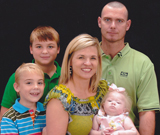Complications Before Birth
A Sad Day

On the day the prenatal ultrasound showed the sex of their third child, Zeta's family also found out about some health concerns. The ultrasound showed their baby girl's growth was restricted, and there was something wrong with her kidney. Further tests revealed Zeta's head was disproportionately small, and the development of the brain didn't seem to be progressing as expected.
Zeta was born March 5, 2010, weighing 4 pounds and 10 ounces. Immediately, she was diagnosed with a non-functioning kidney, cleft palate, narrowing in one of her nasal passages, coloboma of the eyes (essentially a cleft in the eye), minor heart defects, possible hearing loss, breathing issues and poor muscle tone. Within a couple of weeks, Zeta was also diagnosed with CHARGE syndrome, a genetic disorder affecting most organs of the body.
Over the next few months, Zeta was continually taken home and then readmitted to a local hospital for the same symptoms: fever, seizures involving full body convulsions, facial twitching, involuntary smiling, oxygen desaturations and feeding intolerance. Most times the final diagnosis would alternate between pneumonia and an urinary tract infection (UTI).
Zeta's mom, Angel, was convinced most of her daughter’s problems stemmed from a neurological issue. But the opinions of the medical staff varied – some believed it was neurological, while others thought it had to do with the heart.
At 8 months, Zeta’s breathing became more problematic, and a trach was placed into her neck. At this same time, an MRI was done of her brain. The diagnosis was tuber cinerum, also known as Hypothalamic Hamartoma (HH). The doctor said it was very rare and they didn't know much about it, but it could be related to seizures. So they recommended Zeta be referred out to another hospital.
Brain Surgery Stopped Her Seizures
Zeta was born with HH; a rare, benign brain tumor suffered by only one out of about a million people. The location of the tumor makes removal extremely difficult – a feat most surgeons decline to tackle. If not treated, symptoms, including seizures, mental disability and behavioral problems occur which become increasingly disabling.
Through research, the family discovered their two possible destinations to bring their daughter for surgery – either go to Australia or Arizona. Barrow Neurological Institute at Phoenix Children’s is one of a few medical centers in the world with the best care, skill and expertise to handle cases like Zeta’s.
Since Zeta had severe respiratory problems requiring the use of a ventilator, her trip to from South Carolina to Phoenix required a five hour trip in an air ambulance with all the necessary medical equipment and personnel on board.
Seeking Help in the Desert
As soon as they arrived at Phoenix Children's, Zeta was evaluated and ordered to have follow-up tests to pinpoint exactly where the seizures were coming from. Epilepsy surgery expert, Dr. Ruth Bristol, from the Barrow Neurological Institute at Phoenix Children's was brought in to lead her care and collaborate with other multidisciplinary specialists at the Hospital.
All the doctors agreed surgery was the best option to help her develop. With the operation, she has a chance to live a relatively normal life.
In July 2011, Dr. Bristol performed a stereotactic resection of the 1 cm HH on Zeta at 16 months old. Following the surgery, her family has seen a drastic improvement – Zeta went almost seven weeks without any seizures whereas before they occurred daily.
How She's Doing Now
To date, Zeta has had 20 hospitalizations, a dozen procedures and has spent most of her life in the intensive care unit (ICU). Her family feels so grateful and blessed to have so many caring doctors, nurses and therapists – even under the most stressful circumstances.
Since surgery, Zeta is doing much better and has remained out of the hospital for over two months – a record for her. She is only on the ventilator while she sleeps at night and is even without oxygen for some stints during the day. Since surgery, Zeta has endured numerous blood draws, tests, X-rays and genetic testing. All of her results continue to come back normal.
“We love our Zeta girl!" Zeta's mom, Angel, said. "And are so thankful for the team at Phoenix Children’s for her continued health."
Story credit: Hope for HH Foundation
